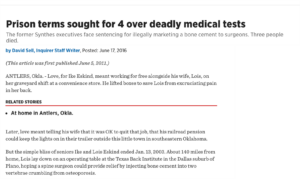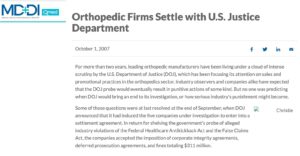This is me in my former life. I spent 10 years in medical device sales.

Right: Tim Jones at work in his previous life as a sales person for surgical medical devices.
Yes, think of Netflix programmes like “The Pharmacist” and “Painkillers” but not as seedy. At least the products I sold were actually fixing people who had things actually wrong with them.
Life was great. I had tons of money, a free car, healthcare, I’d get to go to the best restaurants, travelled internationally and was generally living an amazing life.
I thought I was living a life of meaning and I was, to a degree. My job was to go into operating theatres and ensure that the surgical teams got the best outcomes for the patients they were operating on.
But I wasn’t truly purpose driven. Because fundamentally I was only focused on me maximising my financial return.
After a while, I got thinking about things I was seeing in the industry that didn’t sit right with me.
It started when one of the companies I was working for got into a spot of trouble.

A company Tim worked with allowed patients to die rather than admit their product was not ready for market.
MEDICAL MISADVENTURES
The medical device industry is hyper competitive and for companies to maintain market share they need to stay ahead of the pack. This means launching products to market as quickly as possible. It also means that patient care is not always the priority as was demonstrated with four patients dying on the operating table with the launch of one product. Sadly, this launch was being driven by the surgeon who was also as shareholder in the company.
At the time though, the internal spin machine kicked in and you are soon able to compartmentalise this and move on.
A few years later, there was another speed wobble when a whistle-blower in one of the major device companies reported their company to the US Department of Justice for making illegal payments to surgeons. They were, in many cases, literally being paid by the companies to use their products.

Again, the companies came out with the spin. ‘It’s a level playing field’ they said. ‘We are all doing it so it must be okay, right?’
Something inside of me just didn’t feel right.
I started to question what I was doing.
It was the birth of my daughter, Daisy, on the backdrop of the Canterbury earthquakes that made me really sit up and take a good look at what I was doing.
After all, if an industry that should be all about saving people was knowingly killing them just to make more money, what was I doing?
Some of the companies that I worked for even had the values about how their primary aim was to make people better engraved in stone in their offices, but it just wasn’t true.
All they cared about was profit maximisation at any cost, and the surgeons were not much better!
I got to feeling that I was living against my moral compass, I was a part of a system and a way of doing things that didn’t align.
Ultimately, I got to thinking there had to be more to life?
THE AHA MOMENT
And so, in 2013 I finally decided enough was enough. I made the leap.
I clearly remember the moment when that switch was flicked. I was standing in the operating theatre bearing witness to some appalling but typical behaviour. I went home afterwards and said to my wife, ‘I’m done’.
Now, the medical device world is a very strange one in many ways and so I thought perhaps all the things I’d seen were specific to that industry.
So, I applied for around 60 different roles in all sorts of industries. I just wanted to get a feel for what else was out there.
Ultimately, I was hired as the General Manager for a firm of surveyors in Christchurch.
At first it felt great.
I was building a team and helping them pursue opportunities that were supporting the rebuild of Christchurch after the earthquakes of 2010 and 2011.
But after a while the cracks started to appear.
Within the company, it was clear that maximising profit was the overarching driver for all decisions – frequently at the expense of personnel.
But beyond that, most of the people in the wider construction industry also just cared about maximising their financial return at any cost to society or the environment,
It was a proper case of out the frying pan and into the fire.
There was this growing misalignment within me – what I now call the authenticity gap.
There were two Tims living inside me – Work Tim and Home Tim.
Work Tim is the one who towed the line and nodded in the meetings about increasing utilisation and productivity while Home Tim was in my heart telling me that I was on the wrong path.
And I was really struggling with life. With this dualism. I couldn’t get my head around the fact that life was just going to be like this.
Is this all there is for the next 40 years?
I figured ‘well it must be me, not them’ and this created some high levels of depression and anxiety. I just wanted out of this system.
But to help work out why I was feeling that way, I went searching inside myself for some answers:
How had I ended up here?
How had we all ended up here?
Why did I spend so long thinking that what I was doing was actually okay?
Why couldn’t anyone else see what I was seeing?
Surely, I couldn’t be the only one struggling with how we were running the show?
Well, the good news is that I wasn’t alone.
Having gone down a Google rabbit hole I stumbled across this group called B Corporation.
B what?
Certified B Corps are a new form of business that seeks to balance purpose and profit. This means that rather than solely focusing on profit maximisation, they consider the impact of their operations on their workers, customers, suppliers, community, and the environment.
There was this collection of businesses around the world that felt the same way as me!
They had a common vision of working to be the best for the world, not the best in the world.
They were these amazing organisations that had a declared higher purpose that was prioritised over just making a profit.
A bit more research showed that there was even one in New Zealand, and it was called Eagle Protect and it was in Christchurch!
After a week of umming and ahhing I figured I had nothing to lose so I sent the CEO Steve Ardagh an email and asked him if I could come round for a cuppa.
A 45-minute meeting turned into a 2 ½ hour extravaganza of my mind being blown by the possibilities of this B Corp movement.
I knew that this is what I had been looking for.
I’d found my tribe.
But how could I get amongst it?
Initially I thought that I could get the surveying company I worked for to look at B Corp.
But they were just not interested.
At the same time, I was also keen to explore the idea of coaching and training as a career path. It had been something that I had toyed with for a few years but didn’t know how to get into it.
After a couple of conversations with some contacts though I managed to get a role doing just that.
Working for a small family-owned business that was values-aligned, I thought they might be open to this B Corp idea, but they just had too much on their plate to consider it.
It seemed that I’d reached a dead end.
But then I figured I’d been talking to everyone about this B Corp concept, perhaps I should pony up and go do it myself.
And in late 2015, I was offered the perfect opportunity as I and the rest of the team were made redundant from the training company.
Now for anyone contemplating the leap into self-employment, here are a few tips on how not to do it:
- Don’t have a young child.
- Don’t have a partner who is not earning because they are looking after said child.
- Don’t have a mortgage.
- Don’t have a father living in the UK that gets diagnosed with stage 4 cancer.
There were compelling arguments pulling me back, to go and get a ‘proper job’ as my mum would say, but my sense of resolve was massive due to my sense of purpose, and I knew I only had one option.
To go and start my own B Corp.
2016 was a year of challenge for sure.
Starting a business in a fledgling industry was tough enough.
But the harder conversations were to be had with my father over three-month long trips back to the UK as we tried to work out our relationship as he was getting more ill.
All the while trying to make a crust and keep my business alive.
But the more I looked at what I felt I was being pulled to do, the more my resolve was strengthened,
Unfortunately, November saw my father pass but by the end of 2016, the launch of my new company, Grow Good, was on track.
I was certified as one of the first 10 B Corps in NZ and my personal purpose was locked in – to co-create a world of abundance that my daughter could inherit, where every human thrives in a manner that is regenerative to each other and the planet we call home.
And that’s what I am all about now.
I do that by helping others get on the B Corp journey.
Maybe you want to grow more good in your world?
Maybe you don’t know where to start?
It’s completely up to you but our e-book could be a great place for you to start to learn more about B Corp and how it can help you become the business the world needs right now… or if you’re ready to chat about it, book some time in with me here.
Yours in purpose,
Tim




 If you’re in business, chances are you’ve already heard about B Corp certification. If so, you’ve probably wondered whether it’s the right thing for your company. You’ll most likely be asking yourself, ‘How will I benefit?’ and ‘Where do I even begin?’ Excellent questions! Let’s first address how your business could benefit and then we’ll tell you how to begin.
If you’re in business, chances are you’ve already heard about B Corp certification. If so, you’ve probably wondered whether it’s the right thing for your company. You’ll most likely be asking yourself, ‘How will I benefit?’ and ‘Where do I even begin?’ Excellent questions! Let’s first address how your business could benefit and then we’ll tell you how to begin.